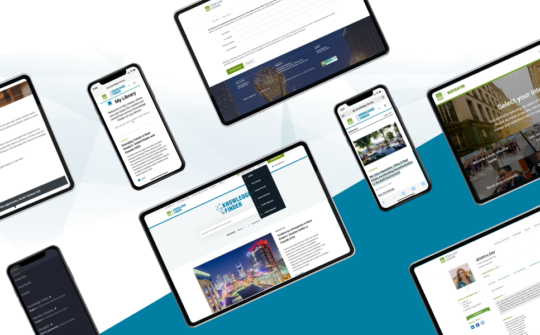
Former District of Columbia mayor and current head of Federal City Council Anthony Williams, who is credited with revitalizing the capital city of the United States, has been named the 2020 recipient of the ULI Prize for Visionaries in Urban Development, the most prestigious and respected honor in the land use and development community.

Williams is the third Mayor to receive the prize, which recognizes an individual who has made a distinguished contribution to community building globally, who has established visionary standards of excellence in the land use and development field, and whose commitment to creating the highest-quality built environment has led to the betterment of society.
The $100,000 ULI Prize for Visionaries in Urban Development was established in the year 2000 through a gift by the Miller Nichols Charitable Foundation to the ULI Foundation. In 2020, ULI will honor Williams as the 21st Prize Laureate and feature him as a speaker at the ULI Fall Meeting, which will be held virtually from October 13-15.
Mayor Williams is credited with stabilizing the District’s financing and revitalizing its downtown core, first as chief financial officer from 1995-1998 and then as mayor from 1999-2007. Under Mayor Williams’s leadership, the city enjoyed strong surpluses, along with reestablishing the credit rating of the city. This allowed for regeneration of its downtown, especially along the 14th and H Street corridors, which now house trendy restaurants and are prime destinations for both visitors and residents of the District.
“I am truly honored to be the latest recipient of the ULI Prize for Visionaries in Urban Development,” said Williams. “I would encourage every mayor and city official to heed the words of the old Japanese proverb ‘Vision without action is a daydream; action without vision is a nightmare.’ I saw the vision of what I wanted the District to be and worked hard to achieve that. You need to marry the ability to execute, which is fundamental to a community, but the cornerstone of building a successful community is to have a vision toward which you can execute.”
As mayor, Williams also negotiated the return of professional baseball to the District, executing a new stadium deal that saw the Montreal Expos relocate to the District and become the Washington Nationals. The stadium deal also led to another renaissance, this time along the Waterfront District, bringing much needed investment to the area.
ULI Trustee Jodie W. McLean, chief executive officer, EDENS, Washington, D.C., chaired the jury that selected Williams as this year’s winner. “To me a visionary is someone who can not only see a better future but can concisely communicate what that looks like to inspire others to follow,” said McLean. “This is what Anthony Williams did when he first became mayor of D.C. He laid out a very inspirational vision of what the city could look like – the growth of the city, the economics of this city, and the spirit of this city – and inspired all of us to be a part of his vision, and to work hard to make it come to fruition.”
Williams is the current chief executive officer of the Federal City Council (FC2), which is a nonprofit, nonpartisan, membership-based organization dedicated to the advancement of civic life in the nation’s capital. Established in 1954, the FC2 recognizes that improvements in the District of Columbia’s social, economic and physical infrastructure require innovative, tireless work and seeks long-term solutions to complex, community-based problems that produce lasting change and a stronger D.C. Williams was instrumental in assisting with an unprecedented regional response to the Washington Metro Area Transit Authority (WMATA) capital crisis, which led to a permanent $500 million capital infusion from the governments of Virginia, Maryland and the District of Columbia. This money has allowed WMATA to spend additional money on improvements throughout the rail system.
In addition to Jury Chairwoman McLean, the other 2020 ULI Visionaries in Urban Development Prize jury members were Maurice Cox, commissioner of the Department of Planning and Development (DPD), City of Chicago, Chicago, Illinois; Chris Frampton, managing partner, East West Partners, Denver, Colorado; former ULI Global Chairman Randy Rowe, chairman, Green Courte Partners, Chicago, Illinois; and Americas Executive Committee Member and Global Governing Trustee Leslie Woo, chief planning and development officer, Metrolinx, Toronto, Ontario, Canada.
“I think that Anthony Williams is an extraordinary leader and a deserving recipient of the ULI prize, in large part because this award requires the recipient to be visionary, but also grounded,” Cox said. “A visionary has the ability to look beyond the conditions of the present day, while a grounded individual remains mindful of today’s challenges, deadlines and competing views. Mayor Williams is an inspired choice for the prize because he responds so well to present conditions while being squarely focused on the long-term future of the city.”
“Mayor Anthony Williams’ turnaround of D.C. was nothing short of remarkable,” said W. Edward Walter, global chief executive officer of ULI. “He is truly a visionary in every aspect of his life. I have the privilege to work with him at the Federal City Council, and every time we meet, I see his passion for the city and his desire to make this area a thriving community. I can think of no better person to receive the honor this year.”
Recent laureates have included architect Alejandro Aravena, Santiago, Chile; artist and urban planner Theaster Gates, Chicago, IL; transportation entrepreneur Robin Chase, Boston, MA; architect and urban planner Dr. Cheong Koon Hean, Singapore; and architect Lord Richard Rogers, London.
The full interview with Williams is available online at Urban Land and more about the Prize is available online at uli.org/visionaries.
Explore


